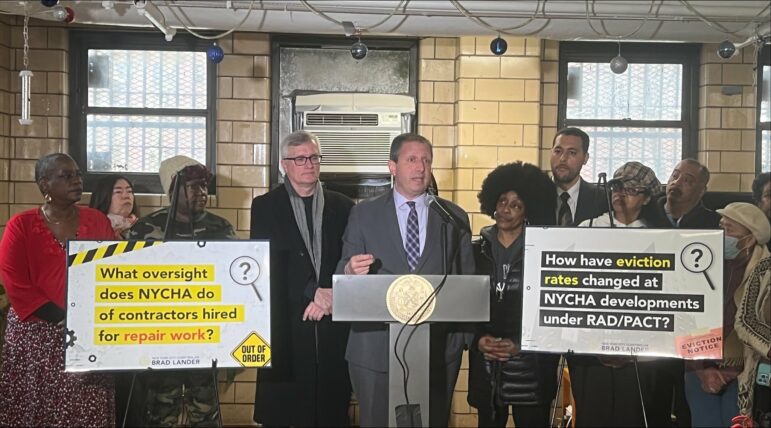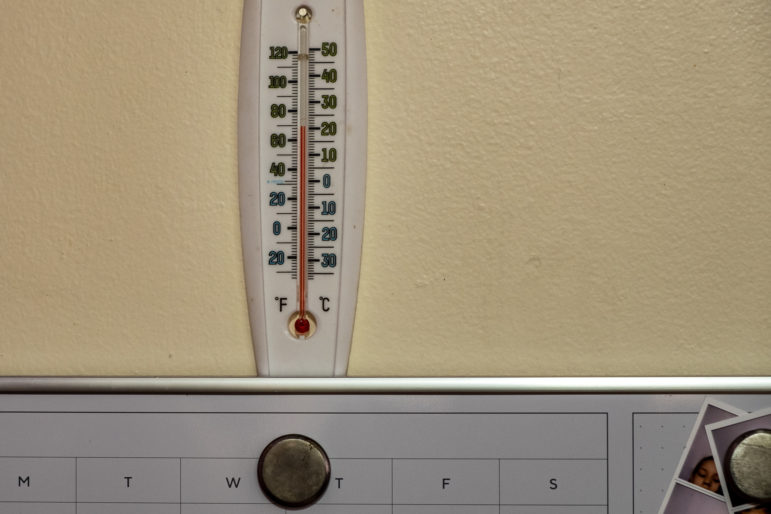
Office of New York City Comptroller
Comptroller Lander and tenants at the Smith Houses announced the subjects of the two audits at a press conference Wednesday.The New York City Comptroller’s Office will investigate oversight of NYCHA contractors and eviction rates at privatized developments — the first of two probes under a new initiative that lets NYCHA tenants weigh in directly on public housing audits.
Comptroller Brad Lander, State Sen. Senator Brian Kavanaugh, Councilmember Christopher Marte and the newly formed resident audit committee, consisting of 21 NYCHA tenants, announced the initiation of the audits Wednesday, saying the effort will help restore trust for the NYCHA community.
Lander introduced the audit committee in December after his office conducted a series of town halls and roundtable discussions, saying he wanted to create a team of NYCHA residents from all five boroughs for feedback during the audit process. The Comptroller’s office must audit all agencies that receive city funds at least once every four years.
“The whole idea here was to come out with something that was different than what would have been done if our staff—even though some of them have lived in NYCHA or have family members there—are different from what I would have selected,” said Lander. “Finding solutions in city government requires deep commitment to doing the work and we are so excited to be getting started on that this year.”
For the first audit, the committee asked the comptroller’s office to focus on repair work and how contractors get hired and evaluated. Officials say NYCHA needs an estimated $40 billion in capital repairs to bring its aging housing stock into good order, including $15 billion to address mold infestations alone.
There were more than 679,000 open work orders across NYCHA in January—up nearly 17 percent from the year before—and the length of time it takes the housing authority to complete repairs has also increased, from an average of 296 days in January 2022 to 345 days last month.
Tenants often complain of repair orders being marked as complete before the actual repairs are done, according to the comptroller’s office; sanitation and safety issues also rank high among residents’ concerns.
Aixa Torres, president of the Alfred E. Smith Resident Association on the Lower East Side, said the audits are reminders of the struggles residents have faced and are important to finding solutions to critical quality of life issues. A September field review by the comptroller’s office, for example, found that more than 40 percent of the locks at NYCHA building entrances were broken.
“This audit to me is personal,” said Torres. “It means saving lives, making people accountable when they come into our communities and understanding that we have rights.”
For the second audit selected by the resident committee, the Comptroller’s Bureau of Audit will examine eviction rates at NYCHA properties enrolled in the Rental Assistance Demonstration-Permanent Affordability Commitment Together (RAD-PACT) program. Under RAD-PACT, management of NYCHA developments is turned over to private real estate companies, allowing them to tap into federal subsidies that are more lucrative than traditional NYCHA funding streams.
The city has positioned the arrangement as one of the few options available for NYCHA to raise desperately needed repair funds, but RAD-PACT has been met with some criticism. Brenda Temple, a member of the Committee for Independent Community Action and a resident of Ocean Bay Apartments in Far Rockaway, Queens, said she wants to know the number of evictions at developments like hers where the RAD/PACT conversion has already taken place.
Temple cited a 2022 report by the group Neighbors Helping Neighbors that surveyed tenants at Ocean Bay, 61 percent of whom said their rent increased under RAD-PACT and 19 percent who said management tried to evict them. Another report released by the group Human Rights Watch last year found a higher eviction rate at RAD-PACT NYCHA campuses compared to the system average.
“It is also not clear that RAD has led to consistent improvement to the quality of housing with tenants reporting safety hazards and half done projects,” said Temple. “City resources should be directed towards robust outreach to tenants in converted buildings to learn more about tenant experiences at RAD/PACT.”
The two comptroller audits will be carried out over the next several months. Sen. Kavanaugh, who heads the State Senate’s housing committee, said having the tenant-led audit committee was a “wonderful step forward.”
“There’s no better place to start than by centering the residents of public housing who have been through so much,” Kavanaugh said.







